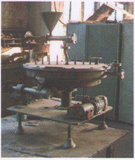A NEW HIGH-PERFORMANCE AND ECOLOGICALLY CLEAN TECHNOLOGY FOR ARSENIC SULFIDE ORES PROCESSING

Figure 1. General view of plant for arsenic sulfide ores processing.
Description:
A new high-performance and ecologically clean technology for arsenic sulfide ores processing has been offered. The pilot plant original construction for such technology providing is designed and manufactured.
For this problem solving the total arsenic recovery and obtaining arsenic with enough purity, the most rational is the principle of several physicochemical methods, for example sublimation of a concentrate or arsenic ore, breathing of vaporous arsenic sulfides from zone and oxidizing by atmospheric oxygen in a gaseous phase in a separate reactor.
The white arsenic is a raw material for production of arsenic metal and its compounds. Therefore the maximal extraction of white arsenic and its purity strongly determines the quality of further obtained substances. Almost all complex non-ferrous metal ores contain the arsenic in one or another form. Without arsenic elimination it is impossible to treat ores. The eliminated arsenic in the form of oxide generates huge embankments of toxic substances, because the arsenic is contaminated by impurities such as tin, nickel, cobalt, silver, iron, bismuth, antimony, sulfur, tellurium and others The product, obtained by such method is low-grade and can not be represented as final product of white arsenic..
Almost all complex non-ferrous metal ores contain the arsenic in one or another form. There is a huge amount of treated nonferrous metal ores, so the arsenic forms huge embankments of toxic substances, commonly in the form of oxides. Such substances are low-grade (with arsenic content up to 40-60%) and substantially contaminated by impurities such as tin, nickel, cobalt, silver, iron, bismuth, antimony, sulfur, tellurium and others. By this reason the product, obtained by such method is low-grade and can not be represented as final product of white arsenic. The offered technology and facilities are also high- effective for these wastes treatment in order to produce conditioned product — white arsenic.
Innovative aspect and main advantages:
1. High level of mechanization of process conducting
and release of personal who is working under harmful
conditions.
2. Process intensification on the basis of increasing
productivity of new technology and installation
construction.
3. Increasing arsenic recovery from 95 — 97% against
75 —83% by means of oxygen-free heat treatment of
arsenic - bearing raw materials.
4. Increasing purity of final product from 94.2 — 99.7% against 92.0 — 95%.
5. Decreasing electric power consumption by means
of decreasing temperature of process from 750 °C to
650 °C, shortening the time of process duration from
4 — 6 hours up to 1.5 — 2 hours and furnace design
features..
6. Improving the demands to environment on the
basis that residues won’t contain toxic mixtures of
arsenic and amount of arsenic in residues is
decreased, which on the other hand doesn’t require
additional investments for burial of mine waste.
Areas of Application:
Along with other advanced materials, the arsenic - bearing compounds are successfully applied in microelectronics, semiconductor and laser engineering, fiber optics, television tubes, visualization of IR radiation, optical glass melting, holography, electron diffraction analysis and a lot of other scientific and industrial areas. Thus, the special attention is paid to purity of basic materials.
Stage of Development:
A pilot plant for arsenic sulfide ores processing has been create within STCU Project #Gr-105 framework and operates in Georgian Technical University.
The works connected with plant modernization and its adaptability for arsenic-containing industrial wastes treatment are conducted.
The license application is in a stage of preparation.
Contact details:
Prof. Tengiz S. lashvili
Training and Research Center for Chemical
Technology and Management
Georgian Technical University
69, Kostava St., Tbilisi 0175 Georgia
Tel: +995 (32) 237-44-84
Fax: +995 (32) 294-20-33
Email: t_iashvili@gtu.ge

